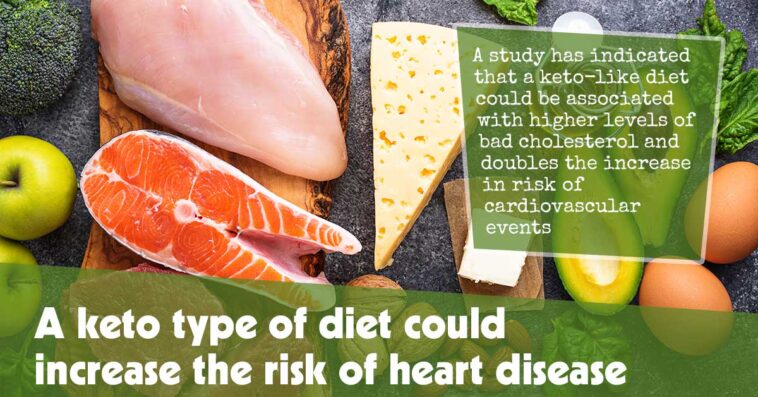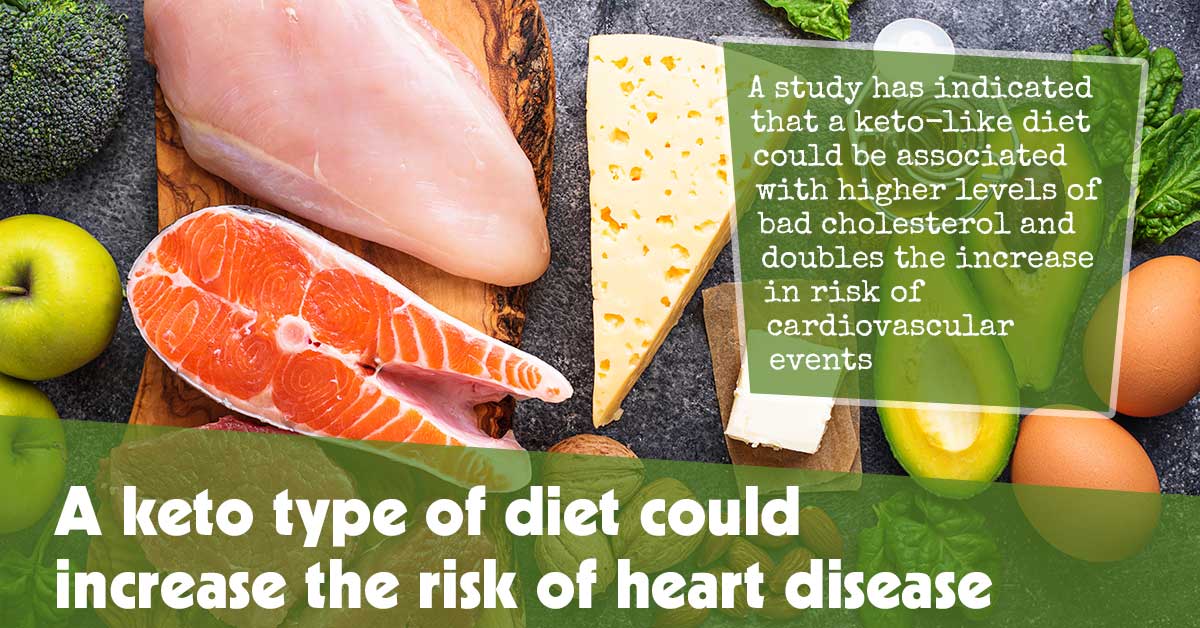The ketogenic or keto diet, involving the consumption of very low quantities of carbohydrates and high quantities of fats has become popular. A study has however indicated that a keto-like diet could be associated with higher levels of bad cholesterol and doubles the increase in risk of cardiovascular events which include blocked arteries that require stenting, angina, strokes, and heart attacks.
The study discovered that regularly consuming a low-carbohydrate, high-fat diet was linked to increased LDL cholesterol levels and a greater heart disease risk.
Carbohydrates are the body’s 1st go-to source of fuel providing energy for daily life activities. Low-carbohydrate, high-fat diets, such as a keto diet, limit the consumption of carbohydrates such as baked goods, bread, rice and other grains, pasta, potato products which include chips and fries, and high-carbohydrate vegetables and fruit.
When the body is deprived of carbohydrates, it instead breaks down fat for energy. The fat breakdown in the liver produces chemicals known as ketones that are used as energy by the body in the absence of carbohydrates, hence the term ketogenic, or ketone producing. Ketogenic diet advocates normally suggest restricting carbohydrates to 10% of total calories every day, protein to 20% to 30% of total calories every day, and getting 60% to 80% of calories from fat every day.
Some prior studies have demonstrated that a low-carbohydrate, high-fat diet can result in increased LDL cholesterol levels in some individuals. Although increased LDL cholesterol is an established heart disease risk factor as a result of cholesterol buildup in the coronary arteries known as atherosclerosis, the effects of a low-carbohydrate, high-fat diet on stroke and heart disease risk haven’t been well researched.
For this study, researchers defined a low-carbohydrate, high-fat diet as composed of more than 45% of total calories from fat every day and no more than 25% of total calories from carbohydrates every day. They called this a low-carbohydrate, high-fat diet and keto-like because it’s fairly lower in fat and higher in carbohydrates compared to a strict ketogenic diet. A standard diet was defined as persons not reaching these conditions with more balanced eating habits.
Data were analyzed from the UK Biobank, a health information database with more than 500,000 UK-residing individuals followed for a minimum of 10 years. A 24-hour self-reported diet questionnaire was completed by 70,684 individuals when they were enrolled in the Biobank, who also had their blood taken to check cholesterol levels.
305 individuals were identified whose questionnaire responses suggested that their diet throughout the 24-hour reporting period satisfied the study’s definition of a low-carbohydrate, high-fat diet. These individuals were matched by sex and age with 1,220 persons reporting consumption of a standard diet.
73% of the individuals in each group ended up being women and an average age of 54 years. Individuals on a low-carbohydrate, high-fat diet had a BMI of 27.7 on average; individuals on a standard diet had a BMI of 26.7. A BMI of 25 to 30 falls inside the overweight range.
In comparison to individuals on a standard diet, individuals on a low-carbohydrate, high-fat diet had significantly higher LDL cholesterol levels as well as the protein component called apoB that sits on LDL particles.
Prior studies have demonstrated that elevated apoB could be a more appropriate predictor than increased LDL cholesterol for cardiovascular disease risk. After 11.8 years of follow-up on average and after adjusting for other heart disease risk factors, which include smoking, obesity, high blood pressure, and diabetes, individuals on a low-carbohydrate, high-fat diet had over a 2 times higher risk of having some major cardiovascular events, which included heart attack, peripheral arterial disease, stroke, and artery blockages that required to be opened with stenting treatments.
Overall, 9.8% of individuals on a low-carbohydrate, high-fat diet had a new cardiac event, in comparison to 4.3% of individuals on a standard diet, twice the risk for individuals on a low-carbohydrate, high-fat diet.
It was found that among the individuals on a low-carbohydrate, high-fat diet, those who had the highest LDL cholesterol levels had the highest cardiovascular event risk. The results indicate that individuals who are thinking about going on a low-carbohydrate, high-fat diet need to bear in mind that doing so could increase LDL cholesterol levels.
Individuals ought to consult a healthcare professional before starting this dietary pattern. It’s recommended to monitor cholesterol levels while on the diet and try to consider other heart disease or stroke risk factors, which include smoking, physical inactivity, hypertension, and diabetes.
The results of the study also indicate that not every individual responds to a low-carbohydrate, high-fat diet the same. Cholesterol levels tend to increase on this diet on average, but some individuals’ cholesterol concentrations can remain the same or decrease, depending on a few underlying factors.
A limitation of the study is that dietary information was provided by the individuals only once, which ought to be taken into consideration when interpreting the study results. Self-reporting food consumption can also be inaccurate, although the questionnaire was thoroughly checked.
Because the study was observational, only a connection can be shown between the diet and an elevated major cardiac event risk, and not a causal relationship.




